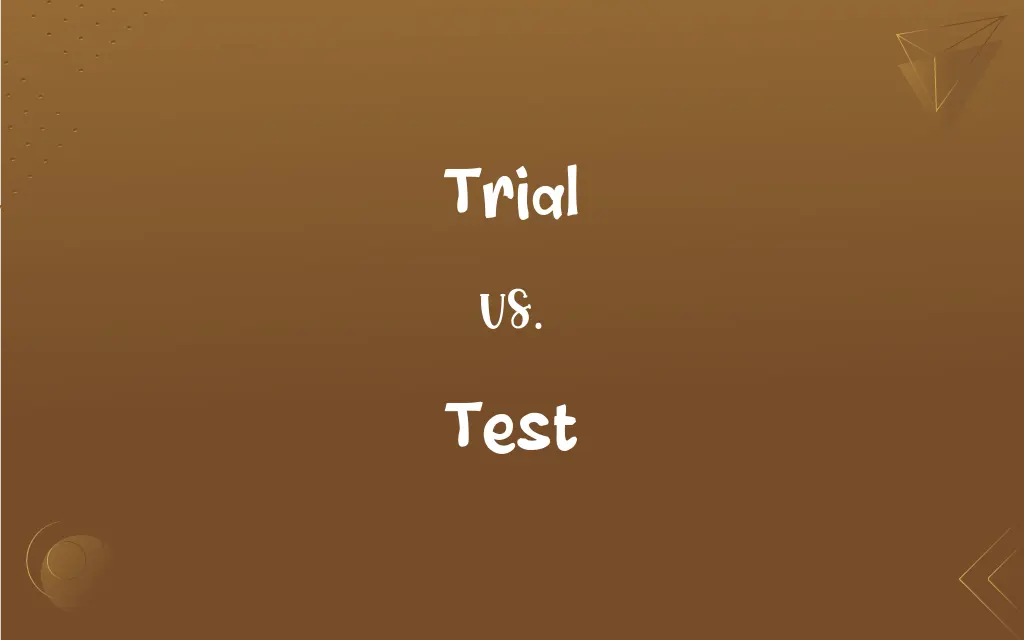Trial vs. Test: What's the Difference?
Edited by Janet White || By Harlon Moss || Updated on November 3, 2023
A trial is a process of evaluating something in a real-world scenario, while a test measures knowledge, ability, or performance in a controlled environment.

Key Differences
Trials are often associated with the law and can also refer to a period of testing the performance, qualities, or suitability of someone or something. For example, a trial in a courtroom evaluates the guilt or innocence of a defendant based on evidence and testimony. Similarly, a trial run of a product assesses its performance under operational conditions.
Tests, by contrast, usually refer to assessments designed to measure knowledge, skills, or abilities in an educational or professional setting. Standardized tests in schools evaluate student learning, whereas trials may be used to describe experimental or observational assessments in a scientific context.
A trial can also signify an ordeal or a hardship someone endures, which tests their endurance or character. In a more practical sense, tests often take place in controlled conditions, such as laboratories or testing centers, to ensure consistency of results.
In technology, a trial version of software allows users to evaluate its features before purchase, whereas a test could be a procedure to ensure that the software functions correctly across different systems and scenarios. A trial focuses on user experience and suitability, while a test checks for functionality and errors.
Trials may involve the repeated use of a product or service to understand its long-term effects or sustainability. Tests, however, are often one-off assessments that aim to establish a snapshot understanding of a particular aspect at a single point in time.
ADVERTISEMENT
Comparison Chart
Context
Legal, experimental, hardship.
Educational, professional, diagnostic.
Duration
Can be extended, sometimes undefined.
Usually of a specific, shorter duration.
Purpose
To evaluate suitability, performance.
To measure knowledge, ability, consistency.
Nature
Often practical, real-world scenarios.
Controlled, standardized conditions.
Outcome
Judgment, decision on quality.
Score, assessment of competence.
ADVERTISEMENT
Trial and Test Definitions
Trial
A formal examination of evidence by a judge, typically with a jury, to decide guilt in a case of criminal or civil proceedings.
The trial for the high-profile case is set to begin next Monday.
Test
A series of actions or operations performed to determine the quality, performance, or reliability of something.
The new app is in beta test to work out any bugs.
Trial
An examination of the capabilities of a person or thing, often in the context of an experiment or evaluation.
The pharmaceutical company conducted a clinical trial of the new drug.
Test
A procedure intended to establish the presence or absence of disease or to monitor its progress.
He had a blood test to check his cholesterol levels.
Trial
An experience that tests a person's endurance or patience.
The loss of his job was a real trial for his family.
Test
An event or condition that can be observed and assessed.
The prototype car will undergo a series of road tests.
Trial
An opportunity to use a service or a product for a limited time to assess its value.
I'm using the trial version of the software before deciding to buy it.
Test
A set of questions or exercises evaluating a person's understanding or knowledge.
She studied all night for the chemistry test.
Trial
A period of testing or probation during which someone or something is tested.
She is on a trial period for the position of sales manager.
Test
An assessment of the capabilities of a person or thing, often in the context of a competition.
The final test of the baking competition was to create a wedding cake.
Trial
A proceeding in which opposing parties in a dispute present evidence and make arguments on the application of the law before a judge or jury
The case is expected to go to trial.
Test
A procedure for critical evaluation; a means of determining the presence, quality, or truth of something; a trial
A test of one's eyesight.
Subjecting a hypothesis to a test.
A test of an athlete's endurance.
FAQs
Is a trial always in a courtroom?
No, a trial can also refer to testing a process or product.
Can a test be something other than questions?
Yes, it can be any evaluation, like a driving test.
Are trial versions of software free?
Usually, they are free for a limited time to assess the product.
Is a trial in sports the same as in law?
No, in sports, it's a try-out or practice session.
Is a test always written?
No, tests can be practical, oral, or performance-based.
Can the word trial imply hardship?
Yes, trial can mean a challenging experience or ordeal.
Are clinical trials only for new drugs?
No, they can test treatments, procedures, and diagnostics.
Do tests always result in a grade or score?
Mostly yes, but some are pass/fail or for data collection.
Are tests infallible measures of ability?
No, tests have limitations and can sometimes be biased.
Are standardized tests the same worldwide?
They vary by country, education system, and purpose.
Can you opt out of a trial?
Depending on the context, yes, especially in research.
Can a trial be a one-time event?
It can be, but trials often involve repeated or extended use.
Do all trials follow the same format?
No, formats can vary widely by field and purpose.
Are test results always numerical?
No, results can be descriptive, qualitative, or binary as well.
Do trials determine final outcomes?
In law, yes; in testing, they provide data for decisions.
Can anyone create a test?
Yes, but standardized tests are often professionally developed.
Does a trial ensure a product is ready for market?
Trials help determine this but don't guarantee it.
Can a trial be without participants?
Trials typically require participants to gather data.
Are tests only for students or professionals?
No, tests are used in many contexts, like health screenings.
Is cheating on a test always academic?
Cheating can occur in any test setting, not just academics.
About Author
Written by
Harlon MossHarlon is a seasoned quality moderator and accomplished content writer for Difference Wiki. An alumnus of the prestigious University of California, he earned his degree in Computer Science. Leveraging his academic background, Harlon brings a meticulous and informed perspective to his work, ensuring content accuracy and excellence.
Edited by
Janet WhiteJanet White has been an esteemed writer and blogger for Difference Wiki. Holding a Master's degree in Science and Medical Journalism from the prestigious Boston University, she has consistently demonstrated her expertise and passion for her field. When she's not immersed in her work, Janet relishes her time exercising, delving into a good book, and cherishing moments with friends and family.































































